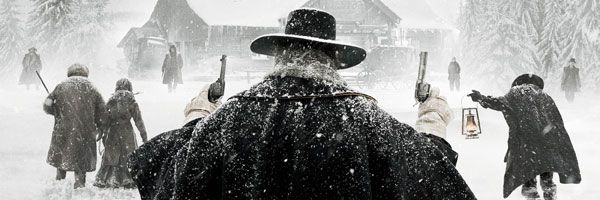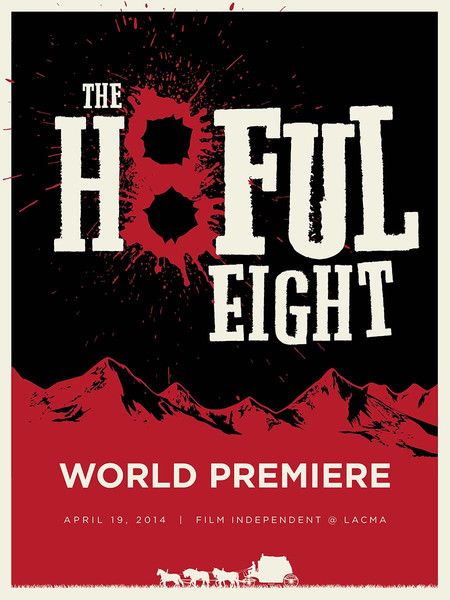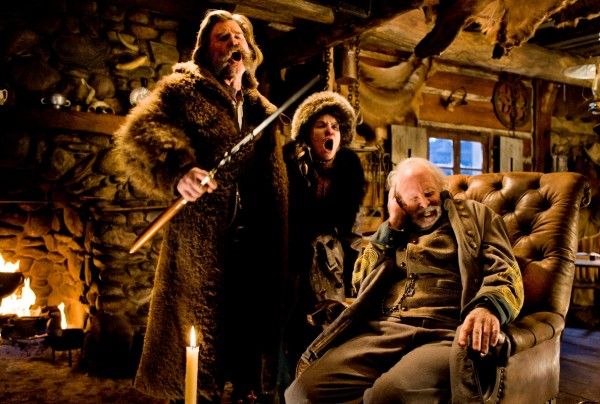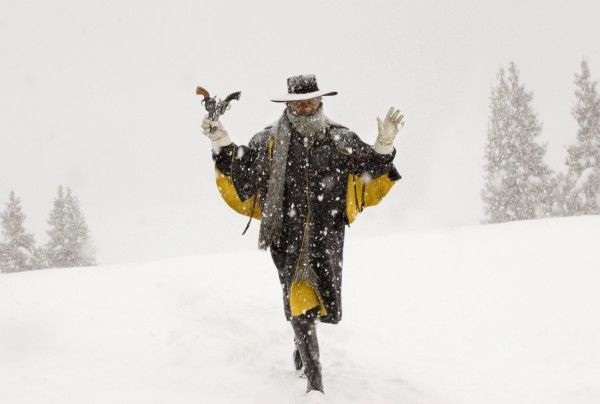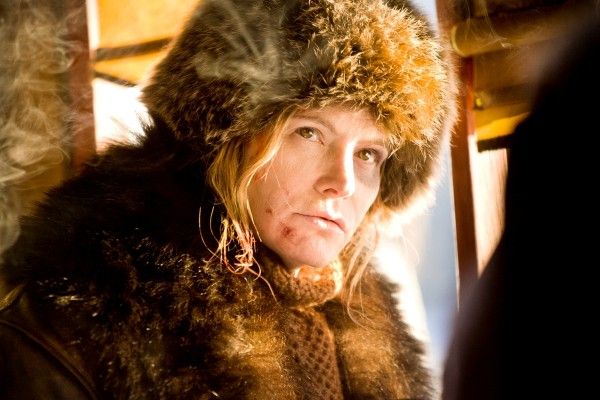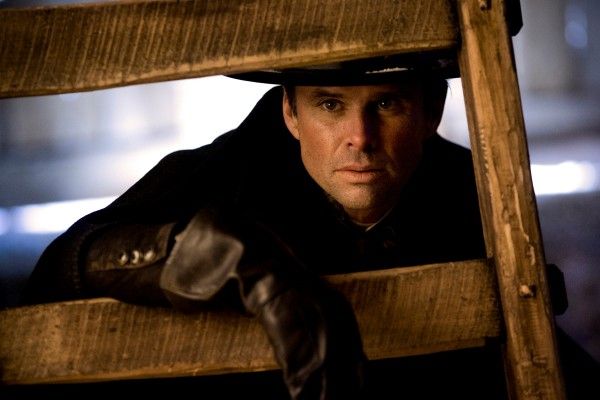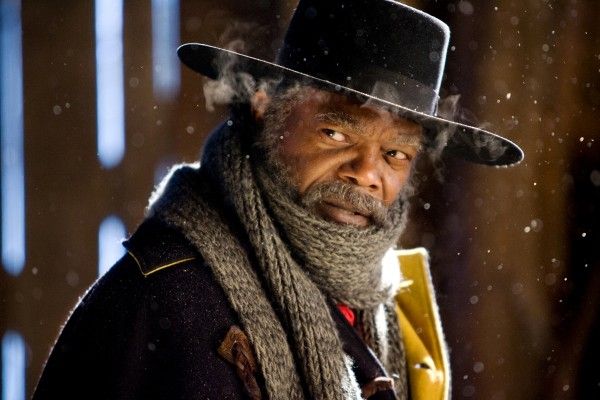Now that Quentin Tarantino's The Hateful Eight has been released nationwide, many have probably forgotten that Tarantino vowed to never make the movie after his script was leaked online and further distributed by Gawker. Tarantino's first official announcement of dropping his lawsuit and deciding to go ahead ahead and make the movie was at a staged live-read at the Theatre at the Ace Hotel in downtown Los Angeles. At said event, most of the cast was present, reading the lines for whom Tarantino originally wrote many of the parts for (including Samuel L. Jackson, Walton Goggins, Kurt Russell, Tim Roth, Michael Madsen, James Parks, Dana Gourrier, Zoe Bell and Bruce Dern). Once the full cast for stage read was announced the declaration of "we're back on!" seemed like a splashy foregone conclusion.
However—as I was in attendance that April night in 2014—there was a more interesting announcement that Tarantino made that day: that this would be the only staging of that draft's original ending. "The ending needs some work," Tarantino told the audience, "and so the entire fifth chapter will be changed." Other than the announcement that the ending would change, the other changes from this stage to celluloid transition was casting; French Bob (played by Inglourious Basterds' Denis Menochet on the theatre stage) became Mexican Bob (Demian Bichir), James Remar's part was re-cast with a bonafide movie star (who we won't discuss until after posting our spoiler warning), and Amber Tamblyn's Daisy was recast with Jennifer Jason Leigh (whom, I will say I spotted in the audience of the live-read talking to Harvey Weinstein and I astutely wrote that she should be in a Tarantino film; hey readers, sometimes armchair casting actually happens!).
As the first four chapters were performed exactly as written and staged 19 months prior (with the great cinematic additions of cinematographer Robert Richardson and composer Ennio Morricone), when I saw the movie The Hateful Eight, I was most interested in seeing how Tarantino tweaked "Chapter Five". And he sure did.
So here we are. The headline for this article will serve as the first nail in the spoiler door, and this will be the second nail to shut it completely. WARNING: The conclusion of The Hateful Eight is discussed in detail below; please continue reading only if you've seen the film and are interested in this trivia and comparison with the original ending.
If you're only interested in who the last man standing was, well, originally it was only Chris Mannix (Goggins) who "survived" the shootout (although in the stage reading, he also received a wound that we presumed will bleed him to death during the blizzard) and Oswaldo (Roth) screams in pain from his soon-to-be-fatal wounds. But who shot who and the order of doing so was drastically different in Tarantino's earlier draft. As far as the orgy of violence goes, the biggest difference between the original draft and the film lies with Jody's character (Channing Tatum played Jody in the film; Remar played Jody in the stage read); in the original script and stage read, Jody got off a lot more rounds, not just some buckshot into Warren's privates. Jody shot Warren (Jackson) many times above ground and he also wounded Mannix. Warren is the one who kills Bob the Mexican in the film, but on stage it was Mannix who killed the Frenchman. But more than who killed who—in terms of violence—it was the treatment of Jody that most shifted from stage to screen.
As our own Matt Goldberg pointed out, the film version of The Hateful Eight gets a riotous laugh from Jody's inglorious death. After spending all of Chapter Four setting up Jody as a criminal mastermind within the gang, he spends most of Chapter Five in the basement where he does hit Warren with a shotgun blast from below, but when he gives himself up and exits the basement he is instantly shot in the head, his head exploding into blood that coats his sister's (Leigh) face. In the original script and stage read everyone gets a few kills, including Daisy who delivers the fatal shot to Warren, who did indeed die on stage.
Essentially the original script just ended in a big chaotic shootout with extra shots to the male genitals. If you've seen the finished film each kill is deliberate and one on one, not a barrage of bullets spraying all around. But more substantial than the killing order is the additional and necessary dialogue that Tarantino added before and after the final execution of Daisy. In the stage reading Daisy does explain the reward on all of the outlaws who've been killed, and she does explain that additional reinforcements are coming, and that she'll let Mannix collect on those who are dead if he lets her go. On stage, she's already killed Warren. But in the film she tries to get Mannix to turn against Warren and she attempts to bait him with not only the cash rewards, but also a racist rant about the untrustworthiness of Warren (who has already spared Mannix's life and teamed up with him as the only ally, because Mannix was about to drink the poisoned coffee).
In both versions Mannix does shoot Daisy instead of attempting to collect a reward. But in the film, Tarantino uses Daisy's racist reminder of how frequently (and abhorrently) Warren's trustworthiness shifts solely because of his skin color. Even though all of the eight individuals are untrustworthy, and have revealed themselves to be liars (although Mannix is the only one whose truthiness is never revealed; is he actually the sheriff?), Warren is only untrustworthy because he admitted that he faked a letter from president Abraham Lincoln in order to keep white folks from killing him simply because they revere Lincoln, and that Lincoln taking a shine to him could give him the type of respect that is afforded to white people from the get go. Daisy forces Mannix to choose sides, and the only thing going against Warren is that he misused the honorable Lincoln's name.
We never learn if Mannix is actually the sheriff of Red Rock. In this way, Mannix is akin to the briefcase in Pulp Fiction, the contents of which are only known by the individual character. What is revealed in the film—and not the stage reading—is the entirety of Warren's forged Lincoln letter, which Mannix reads out loud to end the film; he compliments Warren's flowery additions of Mary Todd to sell it to the already teary reader. Warren doesn't need to know if Mannix is telling the truth about being the sheriff and Mannix doesn't need to prove it to him. Likewise, by reading aloud the Lincoln letter that he knows to be faked, Mannix affords Warren an equal racial plane of existence; Warren doesn't need to carry the seal of approval from an esteemed white man to prove his worth to Mannix. His worth—though earned as a gunslinger and bounty hunter—is earned through his actions, the same as any person should receive regardless of skin color.
In the stage reading and Tarantino's original script, the Lincoln letter is never brought up again after Warren admits that he faked it and explains why. Like many, I think that The Hateful Eight is a lesser work for Tarantino, a bit of a bloated rehash of Reservoir Dogs as the A-side, with some hints of Django Unchained on the B-side. But having attended the stage read and now having seen the final film, it is interesting to see what Tarantino changed. It was only one chapter, but every change he made in that final chapter made for a better film, and added more meaning, weight and importance. His judgement was correct in every capacity of his final act rewrite. Now if only he'd felt the need to make the themes that became apparent in the last chapter a little more apparent throughout the rest of the script, we might've received something more substantial throughout. As is, although it isn't one of his best works, Tarantino's 8th film ended up being a better product than his original draft.
Sounds off in the comments below on your thoughts about The Hateful Eight and the revisions described above. The Hateful Eight is currently playing in theaters nationwide.

